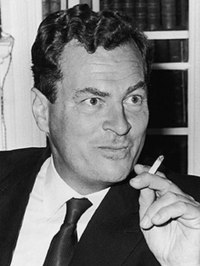Paddy Leigh Fermor
| Sir Patrick Leigh Fermor | |
|---|---|

Leigh Fermor in 1966
|
|
| Born | Patrick Michael Leigh Fermor 11 February 1915 London, England |
| Died | 10 June 2011 (aged 96) Dumbleton, England |
| Occupation | Author, scholar and soldier |
| Nationality | British |
| Genre | Travel |
| Notable works | A Time of Gifts, Abducting a General |
| Notable awards | Knight Bachelor; Distinguished Service Order; Officer of the Order of the British Empire |
| Spouse | Hon. Joan Elizabeth Rayner |
| Military career | |
| Allegiance |
|
| Service/branch |
|
| Years of service | 1940–1946 |
| Rank | Major |
| Battles/wars | Second World War |
| Awards |
Distinguished Service Order Officer of the Order of the British Empire |
Sir Patrick Michael Leigh Fermor, DSO, OBE (11 February 1915 – 10 June 2011), also known as Paddy Fermor, was a British author, scholar, soldier and polyglot who played a prominent role behind the lines in the Cretan resistance during the Second World War. He was widely regarded as Britain's greatest living travel writer during his lifetime, based on books such as A Time of Gifts (1977). A BBC journalist once described him as "a cross between Indiana Jones, James Bond and Graham Greene." The Patrick Leigh Fermor Society was formed in 2014.
Leigh Fermor was born in London, the son of Sir Lewis Leigh Fermor, a distinguished geologist, and Muriel Aeyleen, daughter of Charles Taafe Ambler. Shortly after his birth, his mother and sister left to join his father in India, leaving the infant Patrick in England with a family in Northamptonshire. He did not meet his family in person until he was four years old. As a child, Leigh Fermor had problems with academic structure and limitations. As a result, he was sent to a school for "difficult children". He was later expelled from The King's School, Canterbury, when he was caught holding hands with a greengrocer's daughter.
His last report from The King's School noted that the young Leigh Fermor was "a dangerous mixture of sophistication and recklessness." He continued learning by reading texts on Greek, Latin, Shakespeare and History, with the intention of entering the Royal Military College, Sandhurst. Gradually he changed his mind, deciding to become an author instead, and in the summer of 1933 relocated to Shepherd Market in London, living with a few friends. Soon, faced with the challenges of an author's life in London and rapidly draining finances, he set upon leaving for Europe.
...
Wikipedia
